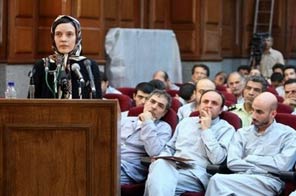Iran press blast Britain
TEHRAN: Iran's hardline press lashed out on Sunday at the role of foreign governments in the post-election turmoil, targeting Britain in particular after British and French embassy staff were put on trial before a revolutionary court.
"The British embassy: headquarters for the coup command," read the front-page headline of the government newspaper Iran after a local British embassy employee was accused of spying by the Tehran court on Saturday.
Hossein Rassam, the main political analyst at the embassy, appeared in court on Saturday along with 24-year-old French lecturer Clotilde Reiss, and Franco-Iranian Nazak Afshar, who works for French embassy's cultural section.
The trial triggered outrage in London, while the European Union's Swedish presidency said it was an act against the entire 27-nation bloc and France demanded the release of Reiss.
"London, the command room of street riots in Tehran, with Washington and Tel Aviv's cooperation," said the front-page headline in the leading hardline newspaper Kayhan.
The paper, whose director is appointed by supreme leader Ayatollah Ali Khamenei, charged that British diplomats were in "constant contact" with the campaign of defeated presidential candidate Mir Hossein Mousavi.
Mousavi has waged a defiant campaign against what he says was President Mahmoud Ahmadinejad's fraudulent re-election on June 12, which triggered massive street protests and turmoil that has shaken the very roots of the Islamic republic.
Ahmadinejad is expected to form his new government this week, although he has already come under fire even from within his own hardline camp over several controversial political decisions.
Moderate conservative daily Tehran Emrouz said Saturday's indictment "named Britain, France and Germany as supporters of a soft coup" against the Islamic regime.
It also said the court hearing was an "indictment against Facebook and Twitter", popular social networking websites which have been used effectively by opposition supporters to spread news and pictures of the protests.
Iran has accused reformist figures arrested in the wake of Ahmadinejad's re-election of seeking to topple the Islamic regime in a "velvet revolution" backed by foreign states including archfoes the United States and Britain.
Khamenei himself pointed an accusing finger at London over the unrest in June, describing it as the most "most evil" of Iran's enemies.
But the opposition has dismissed the charges of foreign meddling, saying the election protest is a grassroots homegrown movement by Iranians demanding their "stolen votes."
Relations between London and Tehran have deteriorated sharply since the election, with Tehran expelling two British diplomats and the BBC's permanent correspondent.
It also detained Rassam -- who was charged with spying on Saturday -- and eight other British embassy staff who were later released. Reiss was detained at Tehran airport on July 1 while on her way to Beirut.
Rassam told the court he had been instructed by his superiors to monitor the protests for the British government, according to local press reports. Foreign media were barred from covering the trial.
"The victory of Mr Ahmadinejad was shocking for the British embassy, and in our first report to London we stressed claims made by one candidate about fraud," Rassam was quoted as telling the court.
British Foreign Secretary David Miliband said he was "deeply concerned by the unjustified charges" against the analyst who had been "going about his legitimate duties."
The French foreign ministry called for the "immediate release" of Afshar and of Reiss, who has been accused of "collecting information and provoking rioters," and sending reports on the protests to the French embassy.
"Actions against one EU country, citizen or embassy staff is considered an action against all of the EU, and will be treated accordingly," the Swedish EU presidency said.






